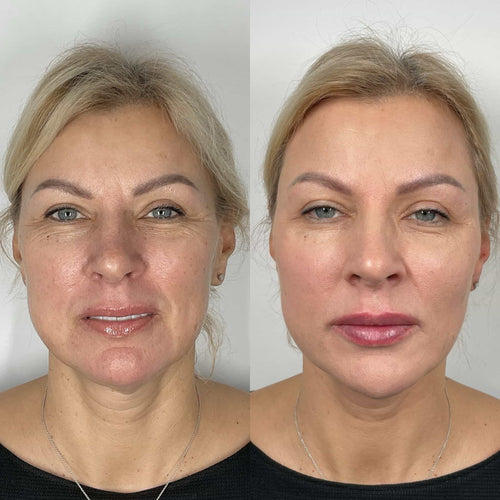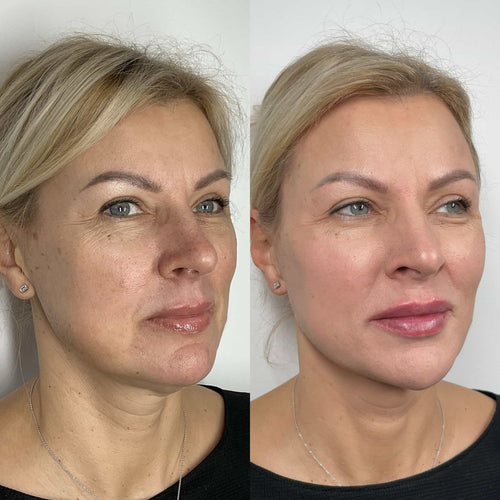Book Your Dermal Filler Appointment with Dr. Laura Geige Now
Immediate Post-Treatment
First Few Hours
Immediate post-treatment care following lip filler injections is crucial for minimizing bruising, swelling, and promoting optimal results.
Here’s a guide to what to expect in the first few hours after your procedure:
-
Avoid touching or rubbing your lips: Resist the urge to touch, massage, or pick at the treated area. This can displace the filler and increase the risk of bruising.
-
Stay hydrated: Drink plenty of water to help flush out any excess fluid and reduce swelling.
-
Apply ice packs: To minimize inflammation and discomfort, apply ice packs wrapped in a towel to your lips for 15-20 minutes at a time, with breaks in between.
-
Elevate your head: Sleeping with your head slightly elevated can help reduce swelling.
-
Avoid strenuous activity: Refrain from intense workouts or activities that could increase blood flow to the treated area and potentially cause bruising.
**Important Note:** While these measures are generally recommended, it’s essential to follow any specific post-treatment instructions provided by your injector. They may have additional recommendations based on your individual needs and the type of filler used.
24-48 Hour Window
Immediately after lip filler treatment, it’s crucial to focus on minimizing swelling and promoting optimal healing within the *first 24-48 hours*.
During this period, it’s generally recommended to avoid anything that could increase inflammation or disrupt the delicate area.
Hard, crunchy, or sticky foods should be off-limits as they can put pressure on the newly injected lips and potentially cause bruising or displacement of the filler.
**Foods to Avoid:**
-
Schedule a Dermal Filler Appointment with Dr. Laura Geige Now
-
Spicy Foods: Heat can stimulate blood flow, leading to increased swelling.
-
Acidic Foods: Citrus fruits and other acidic foods can irritate sensitive skin.
-
Salty Foods: Sodium can contribute to fluid retention, exacerbating swelling.
-
Alcohol: Alcohol is a vasodilator, meaning it widens blood vessels, which may increase inflammation.
-
Caffeine: Similar to alcohol, caffeine can constrict blood vessels, potentially hindering healing.
**Foods to Choose:**

-
*Soft*, *Easy-to-Swallow* Foods:
-
Soups, broths, smoothies, yogurt, applesauce, mashed potatoes are all gentle options that require minimal chewing.
Drinking plenty of water throughout this period is essential for overall hydration and can also help reduce swelling.
Listen to your body and avoid any foods that cause discomfort or exacerbate swelling.
It’s always a good idea to consult with your injector for specific dietary recommendations following your lip filler treatment.
Arrange a Consultation for Dermal Fillers with Dr. Laura Geige

Eating Habits After Swelling Subsides
Food Choices
After swelling from lip filler subsides, it’s essential to continue practicing good eating habits to support healing and minimize the risk of complications.
Here are some food choices to prioritize:
-
Hydrating Foods:**
-
Protein-Rich Choices:
-
Anti-inflammatory Foods:**
Watermelon, cucumber, strawberries, celery, spinach – These fruits and vegetables are packed with water content, aiding in hydration which is crucial for skin health.
Lean meats, fish, beans, lentils – Protein supports tissue repair and regeneration.
Salmon, turmeric, ginger, berries, leafy greens – These foods contain compounds that can help reduce inflammation.
Here are some foods to avoid or consume in moderation:
-
Spicy Foods:**
-
Salty Foods:
-
Acidic Foods:
Capsaicin, the compound that gives chili peppers their heat, can irritate sensitive tissues and delay healing.
Excess salt can increase fluid retention and exacerbate swelling.
Citrus fruits, tomatoes, vinegar – These can irritate the lips and potentially cause discomfort or inflammation.
Remember to listen to your body. If you experience any unusual pain, tenderness, or swelling, consult your doctor.
Hydration and Nutrition
After swelling subsides from lip filler injections, it’s crucial to continue paying attention to your eating habits and hydration for optimal healing and results.
Here are some guidelines to keep in mind:
* **Avoid Extremely Hot or Cold Foods:** These temperatures can irritate the injected area and potentially cause discomfort or even migration of the filler. Stick to lukewarm temperatures until swelling is fully gone.
*
Hydrate, Hydrate, Hydrate:
Water is essential for overall health and plays a vital role in tissue healing. Aim to drink plenty of water throughout the day, especially after your lip filler treatment.
* **Consume Nourishing Foods:** Focus on a diet rich in fruits, vegetables, lean protein, and whole grains. These foods provide the necessary vitamins, minerals, and antioxidants to support collagen production and promote healthy skin regeneration.
*
Limit Alcohol Consumption:
Alcohol can dehydrate you and potentially interfere with the healing process. It’s best to avoid alcohol for at least a few days after your treatment.
* **Be Mindful of Salty Foods:** Excessive salt intake can lead to water retention, potentially causing temporary swelling or inflammation. Moderate your salt consumption during the initial healing phase.
It’s generally recommended to wait at least 24 hours before indulging in spicy, crunchy, or chewy foods. Always err on the side of caution and consult with your injector for specific advice regarding your post-treatment diet.
Long-Term Dietary Considerations
Avoiding Irritants
Long-term dietary considerations after lip fillers are less about avoiding specific foods immediately post-treatment and more about maintaining overall health and supporting collagen production for lasting results.
While there’s no strict “diet” to follow, adopting a healthy eating pattern can contribute to the longevity of your lip fillers and the overall well-being of your skin. This means focusing on:
Hydration: Drinking plenty of water helps plump the skin naturally and keeps it hydrated, which is particularly important for areas treated with fillers.
Antioxidant-rich Foods: Fruits and vegetables are packed with antioxidants that combat free radicals, protecting your collagen from damage. This helps maintain the volume and firmness achieved by the filler.
Protein: Protein is essential for collagen synthesis, the building block of your skin’s structure. Aim for lean protein sources like fish, poultry, beans, and lentils.
Healthy Fats: Omega-3 fatty acids found in foods like fatty fish, flaxseeds, and walnuts promote skin elasticity and hydration, contributing to smoother and more youthful-looking lips.
**Minimizing Sugar Intake:** High sugar consumption can contribute to inflammation and collagen breakdown. Limiting added sugars can help maintain your skin’s integrity.
While some people associate specific foods with swelling or irritation, the evidence is largely anecdotal. Focus on a balanced diet that nourishes your body overall rather than eliminating entire food groups.
Remember, individual responses to fillers and dietary choices can vary. Consult with your injector for personalized advice regarding any concerns you may have about your diet in relation to lip filler results.
### Trigger Foods
When considering long-term dietary considerations after lip filler injections, it’s essential to focus on maintaining a healthy and balanced diet overall. While there aren’t specific foods you need to avoid indefinitely after your treatment, certain foods can potentially irritate the treated area or hinder healing.
Trigger Foods are those that are more likely to cause reactions or discomfort in individuals with sensitive skin or those who experience inflammation. While individual sensitivities vary widely, common trigger foods include:
-
Spicy foods: Capsaicin in chili peppers can cause irritation and inflammation.
-
Citrus fruits: Acidity in citrus fruits like oranges, lemons, and grapefruit can irritate the lips.
-
Alcohol: Alcohol can dehydrate the body and make it more difficult for tissues to heal properly.
-
Salty foods: High sodium intake can lead to water retention and swelling, potentially affecting the treated area.
-
Dairy products: Some individuals experience sensitivity to dairy, which may manifest as inflammation or discomfort.
It’s important to note that these are general guidelines and what triggers one person may not affect another. Pay attention to your body’s response to different foods after lip filler injections and adjust your diet accordingly.
Here are some additional long-term dietary tips:
-
Drink plenty of water: Staying hydrated supports overall health and aids in tissue repair.
-
Eat a balanced diet: Focus on consuming fruits, vegetables, lean protein, and whole grains.
-
Consider supplements: Consult with your healthcare provider about whether supplements like collagen or vitamin C could be beneficial for skin health.
Remember, open communication with your injector is crucial. They can provide personalized recommendations based on your individual needs and medical history.
Dejour Magazine Your Relationship Edge Hopeless Book Live Your Vows Kurious Kittens The Fine Nanny
- Nasolabial Fold Fillers – Marionette Lines Near Badshot Lea, Surrey - December 22, 2024
- How Long After Lip Filler Can You Eat - December 14, 2024
- How To Use CBD Gummy Bears To Enhance Your Daily Wellness Routine - December 8, 2024
